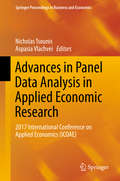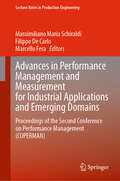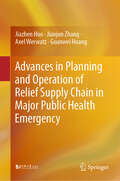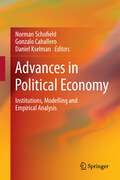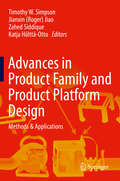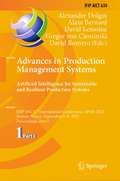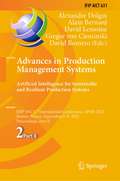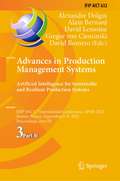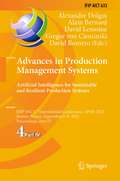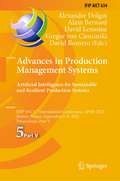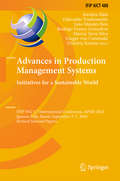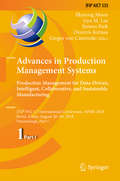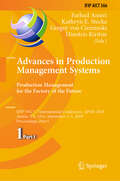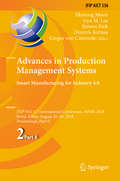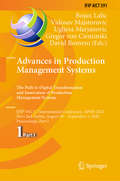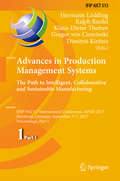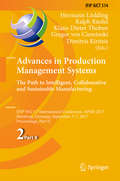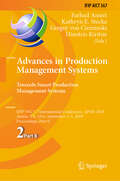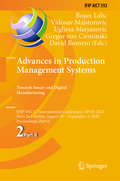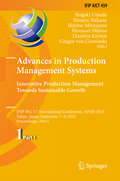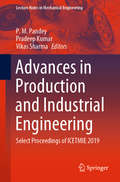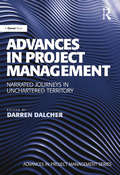- Table View
- List View
Advances in Panel Data Analysis in Applied Economic Research: 2017 International Conference On Applied Economics (icoae) (Springer Proceedings In Business And Economics)
by Nicholas Tsounis Aspasia VlachveiThis proceedings volume presents new methods and applications in applied economic research with an emphasis on advances in panel data analysis. Featuring papers presented at the 2017 International Conference on Applied Economics (ICOAE) held at Coventry University, this volume provides current research on econometric panel data methodologies as they are applied in microeconomics, macroeconomics, financial economics and agricultural economics. <P><P> International Conference on Applied Economics (ICOAE) is an annual conference that started in 2008 designed to bring together economists from different fields of applied economic research in order to share methods and ideas. Applied economics is a rapidly growing field of economics that combines economic theory with econometrics to analyse economic problems of the real world usually with economic policy interest. In addition, there is growing interest in the field for panel data estimation methods, tests and techniques. This volume makes a contribution in the field of applied economic research in this area. Featuring country specific studies, this book will be of interest to academics, students, researchers, practitioners, and policy makers in applied economics and economic policy.
Advances in Performance Management and Measurement for Industrial Applications and Emerging Domains: Proceedings of the Second Conference on Performance Management (COPERMAN) (Lecture Notes in Production Engineering)
by Marcello Fera Massimiliano Maria Schiraldi Filippo De CarloThis book is a compilation of the papers presented at the COPERMAN 2023 conference, a meeting that bridges the gap between academia and industry in the field of performance management. This international conference brought together scientists and engineers from around the world to discuss and address many themes related to performance management, including the development of new methods and systems for performance measurement and management, the evaluation of human performance in various industrial contexts (including modern Industry 4.0 factory environments), and methodologies for business deployment. The book is for academics, graduate students, researchers, and industrial practitioners working in performance management. Its comprehensive coverage of diverse topics and cutting-edge research will provide readers with insights and knowledge that can be applied in their daily work, as well as inspire new research directions and interdisciplinary collaboration.
Advances in Physical, Social & Occupational Ergonomics: Proceedings of the AHFE 2020 Virtual Conferences on Physical Ergonomics and Human Factors, Social & Occupational Ergonomics and Cross-Cultural Decision Making, July 16–20, 2020, USA (Advances in Intelligent Systems and Computing #1215)
by Waldemar Karwowski Richard H. M. Goossens Ravindra S. Goonetilleke Atsuo Murata Shuping XiongThis book reports on cutting-edge findings and developments in physical, social and occupational ergonomics. It covers a broad spectrum of studies and evaluation procedures concerning physical and mental workload, work posture and ergonomic risk. Further, it reports on significant advances in the design of services and systems, including those addressing special populations, for purposes such as health, safety and education, and discusses solutions for a better and safer integration of humans, automated systems and digital technologies. The book also analyzes the impact of culture on people’s cognition and behavior, providing readers with timely insights into theories on cross-cultural decision-making, and their diverse applications for a number of purposes in businesses and societies. Based on three AHFE 2020 conferences (the AHFE 2020 Virtual Conference on Physical Ergonomics and Human Factors, the AHFE 2020 Virtual Conference on Social & Occupational Ergonomics, and the AHFE 2020 Virtual Conference on Cross-Cultural Decision Making), it provides readers with a comprehensive overview of the current challenges in physical, social and occupational ergonomics, including those imposed by technological developments, highlights key connections between them, and puts forward optimization strategies for sociotechnical systems, including their organizational structures, policies and processes.
Advances in Physical, Social & Occupational Ergonomics: Proceedings of the AHFE 2021 Virtual Conferences on Physical Ergonomics and Human Factors, Social & Occupational Ergonomics, and Cross-Cultural Decision Making, July 25-29, 2021, USA (Lecture Notes in Networks and Systems #273)
by Waldemar Karwowski Ravindra S. Goonetilleke Atsuo Murata Shuping Xiong Henrijs Kalkis Zenija RojaThis book reports on cutting-edge findings and developments in physical, social and occupational ergonomics. It covers a broad spectrum of studies and evaluation procedures concerning physical and mental workload, work posture and ergonomic risk. Further, it reports on significant advances in the design of services and systems, including those addressing special populations, for purposes such as health, safety and education, and discusses solutions for a better and safer integration of humans, automated systems and digital technologies. The book also analyzes the impact of culture on people’s cognition and behavior, providing readers with timely insights into theories on cross-cultural decision-making, and their diverse applications for a number of purposes in businesses and societies. Based on the AHFE 2021 conferences on Physical Ergonomics and Human Factors, Social & Occupational Ergonomics, and Cross-Cultural Decision Making, held virtually on 25–29 July, 2021, from USA, it provides readers with a comprehensive overview of the current challenges in physical, social and occupational ergonomics, including those imposed by technological developments, highlights key connections between them, and puts forward optimization strategies for sociotechnical systems, including their organizational structures, policies and processes.
Advances in Planning and Operation of Relief Supply Chain in Major Public Health Emergency
by Jianjun Zhang Jiazhen Huo Axel Werwatz Guanwei HuangWith Operations Research and System Dynamics as research tools, this book discusses the theme of emergency supplies in Major Public Health Emergency (MPHE) scenarios. The subject includes a series of new issues: critical criteria matching supply with demand for emergency supplies in MPHE, emergency medical materials reserve mode, dynamic optimization of emergency logistics, dynamic optimization of allocating multi-period and multi-category emergency supplies, etc. This book is suitable for university teachers, undergraduate and graduate students, and researchers in fields of logistics and supply chain management as well as emergency management. The most important features of this book include: Firstly, to achieve fairness and accuracy of material distribution during the epidemic, this book constructs a material shortage adjustment function. Secondly, from the comprehensive perspective of cross-regional coordination, multi-organization coordination and multiperiod coordination, the operation optimization models of emergency material supply in major epidemic situation are constructed. Additionally, the comparative analysis and empirical research of the practices in China and Germany also reflects the novelty and benefit of the book.
Advances in Political Economy: Institutions, Modelling and Empirical Analysis
by Norman Schofield Daniel Kselman Gonzalo CaballeroThis book presents latest research in the field of Political Economy, dealing with the integration of economics and politics and the way institutions affect social decisions. The focus is on innovative topics such as an institutional analysis based on case studies; the influence of activists on political decisions; new techniques for analyzing elections, involving game theory and empirical methods.
Advances in Power Systems and Energy Management: Select Proceedings of ETAEERE 2020 (Lecture Notes in Electrical Engineering #690)
by Amiya Ranjan Panda Sanjeevikumar Padmanaban Neeraj Priyadarshi Ranjan Kumar Ghadai Ranjeeta PatelThis book comprises select proceedings of the international conference ETAEERE 2020, and focuses on contemporary issues in energy management and energy efficiency in the context of power systems. The contents cover modeling, simulation and optimization based studies on topics like medium voltage BTB system, cost optimization of a ring frame unit in textile industry, rectenna for RF energy harvesting, ecology and energy dimension in infrastructural designs, study of AGC in two area hydro thermal power system, energy-efficient and reliable depth-based routing protocol for underwater wireless sensor network, and power line communication. This book can be beneficial for students, researchers as well as industry professionals.
Advances in Product Family and Product Platform Design: Methods & Applications
by Timothy W. Simpson Jianxin Roger Jiao Zahed Siddique Katja Hölttä-OttoAdvances in Product Family and Product Platform Design: Methods & Applications highlights recent advances that have been made to support product family and product platform design along with successful applications in industry. This book provides not only motivation for product family and product platform design (i. e. , address questions about "why and when should we platform") but also methods and tools to support the design and development of families of products based on shared platforms (i. e. address the "how" and "what" questions about platforming). It begins with a general overview of product family design to introduce the general reader to the topic and then progress to more advanced topics and design theory to help designers, engineers, and project managers plan, architect, and implement platform-based product development strategies for their company. Finally, successful industry applications provide readers and practitioners with case studies and "talking points" to become platform advocates and leaders within their organization.
Advances in Production Management Systems. Artificial Intelligence for Sustainable and Resilient Production Systems: IFIP WG 5.7 International Conference, APMS 2021, Nantes, France, September 5–9, 2021, Proceedings, Part I (IFIP Advances in Information and Communication Technology #630)
by Alain Bernard Gregor Von Cieminski David Romero Alexandre Dolgui David LemoineThe five-volume set IFIP AICT 630, 631, 632, 633, and 634 constitutes the refereed proceedings of the International IFIP WG 5.7 Conference on Advances in Production Management Systems, APMS 2021, held in Nantes, France, in September 2021.*The 378 papers presented were carefully reviewed and selected from 529 submissions. They discuss artificial intelligence techniques, decision aid and new and renewed paradigms for sustainable and resilient production systems at four-wall factory and value chain levels. The papers are organized in the following topical sections: Part I: artificial intelligence based optimization techniques for demand-driven manufacturing; hybrid approaches for production planning and scheduling; intelligent systems for manufacturing planning and control in the industry 4.0; learning and robust decision support systems for agile manufacturing environments; low-code and model-driven engineering for production system; meta-heuristics and optimization techniques for energy-oriented manufacturing systems; metaheuristics for production systems; modern analytics and new AI-based smart techniques for replenishment and production planning under uncertainty; system identification for manufacturing control applications; and the future of lean thinking and practice Part II: digital transformation of SME manufacturers: the crucial role of standard; digital transformations towards supply chain resiliency; engineering of smart-product-service-systems of the future; lean and Six Sigma in services healthcare; new trends and challenges in reconfigurable, flexible or agile production system; production management in food supply chains; and sustainability in production planning and lot-sizing Part III: autonomous robots in delivery logistics; digital transformation approaches in production management; finance-driven supply chain; gastronomic service system design; modern scheduling and applications in industry 4.0; recent advances in sustainable manufacturing; regular session: green production and circularity concepts; regular session: improvement models and methods for green and innovative systems; regular session: supply chain and routing management; regular session: robotics and human aspects; regular session: classification and data management methods; smart supply chain and production in society 5.0 era; and supply chain risk management under coronavirus Part IV: AI for resilience in global supply chain networks in the context of pandemic disruptions; blockchain in the operations and supply chain management; data-based services as key enablers for smart products, manufacturing and assembly; data-driven methods for supply chain optimization; digital twins based on systems engineering and semantic modeling; digital twins in companies first developments and future challenges; human-centered artificial intelligence in smart manufacturing for the operator 4.0; operations management in engineer-to-order manufacturing; product and asset life cycle management for smart and sustainable manufacturing systems; robotics technologies for control, smart manufacturing and logistics; serious games analytics: improving games and learning support; smart and sustainable production and supply chains; smart methods and techniques for sustainable supply chain management; the new digital lean manufacturing paradigm; and the role of emerging technologies in disaster relief operations: lessons from COVID-19 Part V: data-driven platforms and applications in production and logistics: digital twins and AI for sustainability; regular session: new approaches for routing problem solving; regular session: improvement of design and operation of manufacturing systems; regular session: crossdock and transportation issues; regular session: maintenance improvement and lifecycle management; regular session: additive manufacturing and mass customization; regular session: frameworks and conceptual modelling for systems and services efficiency; regular session: optimization of production and transportation
Advances in Production Management Systems. Artificial Intelligence for Sustainable and Resilient Production Systems: IFIP WG 5.7 International Conference, APMS 2021, Nantes, France, September 5–9, 2021, Proceedings, Part II (IFIP Advances in Information and Communication Technology #631)
by Alain Bernard Gregor Von Cieminski David Romero Alexandre Dolgui David LemoineThe five-volume set IFIP AICT 630, 631, 632, 633, and 634 constitutes the refereed proceedings of the International IFIP WG 5.7 Conference on Advances in Production Management Systems, APMS 2021, held in Nantes, France, in September 2021.*The 378 papers presented were carefully reviewed and selected from 529 submissions. They discuss artificial intelligence techniques, decision aid and new and renewed paradigms for sustainable and resilient production systems at four-wall factory and value chain levels. The papers are organized in the following topical sections: Part I: artificial intelligence based optimization techniques for demand-driven manufacturing; hybrid approaches for production planning and scheduling; intelligent systems for manufacturing planning and control in the industry 4.0; learning and robust decision support systems for agile manufacturing environments; low-code and model-driven engineering for production system; meta-heuristics and optimization techniques for energy-oriented manufacturing systems; metaheuristics for production systems; modern analytics and new AI-based smart techniques for replenishment and production planning under uncertainty; system identification for manufacturing control applications; and the future of lean thinking and practice Part II: digital transformation of SME manufacturers: the crucial role of standard; digital transformations towards supply chain resiliency; engineering of smart-product-service-systems of the future; lean and Six Sigma in services healthcare; new trends and challenges in reconfigurable, flexible or agile production system; production management in food supply chains; and sustainability in production planning and lot-sizing Part III: autonomous robots in delivery logistics; digital transformation approaches in production management; finance-driven supply chain; gastronomic service system design; modern scheduling and applications in industry 4.0; recent advances in sustainable manufacturing; regular session: green production and circularity concepts; regular session: improvement models and methods for green and innovative systems; regular session: supply chain and routing management; regular session: robotics and human aspects; regular session: classification and data management methods; smart supply chain and production in society 5.0 era; and supply chain risk management under coronavirus Part IV: AI for resilience in global supply chain networks in the context of pandemic disruptions; blockchain in the operations and supply chain management; data-based services as key enablers for smart products, manufacturing and assembly; data-driven methods for supply chain optimization; digital twins based on systems engineering and semantic modeling; digital twins in companies first developments and future challenges; human-centered artificial intelligence in smart manufacturing for the operator 4.0; operations management in engineer-to-order manufacturing; product and asset life cycle management for smart and sustainable manufacturing systems; robotics technologies for control, smart manufacturing and logistics; serious games analytics: improving games and learning support; smart and sustainable production and supply chains; smart methods and techniques for sustainable supply chain management; the new digital lean manufacturing paradigm; and the role of emerging technologies in disaster relief operations: lessons from COVID-19 Part V: data-driven platforms and applications in production and logistics: digital twins and AI for sustainability; regular session: new approaches for routing problem solving; regular session: improvement of design and operation of manufacturing systems; regular session: crossdock and transportation issues; regular session: maintenance improvement and lifecycle management; regular session: additive manufacturing and mass customization; regular session: frameworks and conceptual modelling for systems and services efficiency; regular session: optimization of production and transportation
Advances in Production Management Systems. Artificial Intelligence for Sustainable and Resilient Production Systems: IFIP WG 5.7 International Conference, APMS 2021, Nantes, France, September 5–9, 2021, Proceedings, Part III (IFIP Advances in Information and Communication Technology #632)
by Alain Bernard Gregor Von Cieminski David Romero Alexandre Dolgui David LemoineThe five-volume set IFIP AICT 630, 631, 632, 633, and 634 constitutes the refereed proceedings of the International IFIP WG 5.7 Conference on Advances in Production Management Systems, APMS 2021, held in Nantes, France, in September 2021.*The 378 papers presented were carefully reviewed and selected from 529 submissions. They discuss artificial intelligence techniques, decision aid and new and renewed paradigms for sustainable and resilient production systems at four-wall factory and value chain levels. The papers are organized in the following topical sections: Part I: artificial intelligence based optimization techniques for demand-driven manufacturing; hybrid approaches for production planning and scheduling; intelligent systems for manufacturing planning and control in the industry 4.0; learning and robust decision support systems for agile manufacturing environments; low-code and model-driven engineering for production system; meta-heuristics and optimization techniques for energy-oriented manufacturing systems; metaheuristics for production systems; modern analytics and new AI-based smart techniques for replenishment and production planning under uncertainty; system identification for manufacturing control applications; and the future of lean thinking and practice Part II: digital transformation of SME manufacturers: the crucial role of standard; digital transformations towards supply chain resiliency; engineering of smart-product-service-systems of the future; lean and Six Sigma in services healthcare; new trends and challenges in reconfigurable, flexible or agile production system; production management in food supply chains; and sustainability in production planning and lot-sizing Part III: autonomous robots in delivery logistics; digital transformation approaches in production management; finance-driven supply chain; gastronomic service system design; modern scheduling and applications in industry 4.0; recent advances in sustainable manufacturing; regular session: green production and circularity concepts; regular session: improvement models and methods for green and innovative systems; regular session: supply chain and routing management; regular session: robotics and human aspects; regular session: classification and data management methods; smart supply chain and production in society 5.0 era; and supply chain risk management under coronavirus Part IV: AI for resilience in global supply chain networks in the context of pandemic disruptions; blockchain in the operations and supply chain management; data-based services as key enablers for smart products, manufacturing and assembly; data-driven methods for supply chain optimization; digital twins based on systems engineering and semantic modeling; digital twins in companies first developments and future challenges; human-centered artificial intelligence in smart manufacturing for the operator 4.0; operations management in engineer-to-order manufacturing; product and asset life cycle management for smart and sustainable manufacturing systems; robotics technologies for control, smart manufacturing and logistics; serious games analytics: improving games and learning support; smart and sustainable production and supply chains; smart methods and techniques for sustainable supply chain management; the new digital lean manufacturing paradigm; and the role of emerging technologies in disaster relief operations: lessons from COVID-19 Part V: data-driven platforms and applications in production and logistics: digital twins and AI for sustainability; regular session: new approaches for routing problem solving; regular session: improvement of design and operation of manufacturing systems; regular session: crossdock and transportation issues; regular session: maintenance improvement and lifecycle management; regular session: additive manufacturing and mass customization; regular session: frameworks and conceptual modelling for systems and services efficiency; regular session: optimization of production and transportation
Advances in Production Management Systems. Artificial Intelligence for Sustainable and Resilient Production Systems: IFIP WG 5.7 International Conference, APMS 2021, Nantes, France, September 5–9, 2021, Proceedings, Part IV (IFIP Advances in Information and Communication Technology #633)
by Alain Bernard Gregor Von Cieminski David Romero Alexandre Dolgui David LemoineThe five-volume set IFIP AICT 630, 631, 632, 633, and 634 constitutes the refereed proceedings of the International IFIP WG 5.7 Conference on Advances in Production Management Systems, APMS 2021, held in Nantes, France, in September 2021.*The 378 papers presented were carefully reviewed and selected from 529 submissions. They discuss artificial intelligence techniques, decision aid and new and renewed paradigms for sustainable and resilient production systems at four-wall factory and value chain levels. The papers are organized in the following topical sections: Part I: artificial intelligence based optimization techniques for demand-driven manufacturing; hybrid approaches for production planning and scheduling; intelligent systems for manufacturing planning and control in the industry 4.0; learning and robust decision support systems for agile manufacturing environments; low-code and model-driven engineering for production system; meta-heuristics and optimization techniques for energy-oriented manufacturing systems; metaheuristics for production systems; modern analytics and new AI-based smart techniques for replenishment and production planning under uncertainty; system identification for manufacturing control applications; and the future of lean thinking and practice Part II: digital transformation of SME manufacturers: the crucial role of standard; digital transformations towards supply chain resiliency; engineering of smart-product-service-systems of the future; lean and Six Sigma in services healthcare; new trends and challenges in reconfigurable, flexible or agile production system; production management in food supply chains; and sustainability in production planning and lot-sizing Part III: autonomous robots in delivery logistics; digital transformation approaches in production management; finance-driven supply chain; gastronomic service system design; modern scheduling and applications in industry 4.0; recent advances in sustainable manufacturing; regular session: green production and circularity concepts; regular session: improvement models and methods for green and innovative systems; regular session: supply chain and routing management; regular session: robotics and human aspects; regular session: classification and data management methods; smart supply chain and production in society 5.0 era; and supply chain risk management under coronavirus Part IV: AI for resilience in global supply chain networks in the context of pandemic disruptions; blockchain in the operations and supply chain management; data-based services as key enablers for smart products, manufacturing and assembly; data-driven methods for supply chain optimization; digital twins based on systems engineering and semantic modeling; digital twins in companies first developments and future challenges; human-centered artificial intelligence in smart manufacturing for the operator 4.0; operations management in engineer-to-order manufacturing; product and asset life cycle management for smart and sustainable manufacturing systems; robotics technologies for control, smart manufacturing and logistics; serious games analytics: improving games and learning support; smart and sustainable production and supply chains; smart methods and techniques for sustainable supply chain management; the new digital lean manufacturing paradigm; and the role of emerging technologies in disaster relief operations: lessons from COVID-19 Part V: data-driven platforms and applications in production and logistics: digital twins and AI for sustainability; regular session: new approaches for routing problem solving; regular session: improvement of design and operation of manufacturing systems; regular session: crossdock and transportation issues; regular session: maintenance improvement and lifecycle management; regular session: additive manufacturing and mass customization; regular session: frameworks and conceptual modelling for systems and services efficiency; regular session: optimization of production and transportation
Advances in Production Management Systems. Artificial Intelligence for Sustainable and Resilient Production Systems: IFIP WG 5.7 International Conference, APMS 2021, Nantes, France, September 5–9, 2021, Proceedings, Part V (IFIP Advances in Information and Communication Technology #634)
by Alain Bernard Gregor Von Cieminski David Romero Alexandre Dolgui David LemoineThe five-volume set IFIP AICT 630, 631, 632, 633, and 634 constitutes the refereed proceedings of the International IFIP WG 5.7 Conference on Advances in Production Management Systems, APMS 2021, held in Nantes, France, in September 2021.*The 378 papers presented were carefully reviewed and selected from 529 submissions. They discuss artificial intelligence techniques, decision aid and new and renewed paradigms for sustainable and resilient production systems at four-wall factory and value chain levels. The papers are organized in the following topical sections: Part I: artificial intelligence based optimization techniques for demand-driven manufacturing; hybrid approaches for production planning and scheduling; intelligent systems for manufacturing planning and control in the industry 4.0; learning and robust decision support systems for agile manufacturing environments; low-code and model-driven engineering for production system; meta-heuristics and optimization techniques for energy-oriented manufacturing systems; metaheuristics for production systems; modern analytics and new AI-based smart techniques for replenishment and production planning under uncertainty; system identification for manufacturing control applications; and the future of lean thinking and practice Part II: digital transformation of SME manufacturers: the crucial role of standard; digital transformations towards supply chain resiliency; engineering of smart-product-service-systems of the future; lean and Six Sigma in services healthcare; new trends and challenges in reconfigurable, flexible or agile production system; production management in food supply chains; and sustainability in production planning and lot-sizing Part III: autonomous robots in delivery logistics; digital transformation approaches in production management; finance-driven supply chain; gastronomic service system design; modern scheduling and applications in industry 4.0; recent advances in sustainable manufacturing; regular session: green production and circularity concepts; regular session: improvement models and methods for green and innovative systems; regular session: supply chain and routing management; regular session: robotics and human aspects; regular session: classification and data management methods; smart supply chain and production in society 5.0 era; and supply chain risk management under coronavirus Part IV: AI for resilience in global supply chain networks in the context of pandemic disruptions; blockchain in the operations and supply chain management; data-based services as key enablers for smart products, manufacturing and assembly; data-driven methods for supply chain optimization; digital twins based on systems engineering and semantic modeling; digital twins in companies first developments and future challenges; human-centered artificial intelligence in smart manufacturing for the operator 4.0; operations management in engineer-to-order manufacturing; product and asset life cycle management for smart and sustainable manufacturing systems; robotics technologies for control, smart manufacturing and logistics; serious games analytics: improving games and learning support; smart and sustainable production and supply chains; smart methods and techniques for sustainable supply chain management; the new digital lean manufacturing paradigm; and the role of emerging technologies in disaster relief operations: lessons from COVID-19 Part V: data-driven platforms and applications in production and logistics: digital twins and AI for sustainability; regular session: new approaches for routing problem solving; regular session: improvement of design and operation of manufacturing systems; regular session: crossdock and transportation issues; regular session: maintenance improvement and lifecycle management; regular session: additive manufacturing and mass customization; regular session: frameworks and conceptual modelling for systems and services efficiency; regular session: optimization of production and transportation
Advances in Production Management Systems. Initiatives for a Sustainable World: IFIP WG 5.7 International Conference, APMS 2016, Iguassu Falls, Brazil, September 3-7, 2016, Revised Selected Papers (IFIP Advances in Information and Communication Technology #488)
by Dimitris Kiritsis Gregor Von Cieminski Irenilza Nääs Oduvaldo Vendrametto João Mendes Reis Rodrigo Franco Gonçalves Márcia Terra SilvaThis book constitutes the refereed post-conference proceedings of the International IFIP WG 5. 7 Conference on Advances in Production Management Systems, APMS 2016, held in Iguassu Falls, Brazil, in September 2016. The 117 revised full papers were carefully reviewed and selected from 164 submissions. They are organized in the following topical sections: computational intelligence in production management; intelligent manufacturing systems; knowledge-based PLM; modelling of business and operational processes; virtual, digital and smart factory; flexible, sustainable supply chains; large-scale supply chains; sustainable manufacturing; quality in production management; collaborative systems; innovation and collaborative networks; agrifood supply chains; production economics; lean manufacturing; cyber-physical technology deployments in smart manufacturing systems; smart manufacturing system characterization; knowledge management in production systems; service-oriented architecture for smart manufacturing systems; advances in cleaner production; sustainable production management; and operations management in engineer-to-order manufacturing.
Advances in Production Management Systems. Production Management for Data-Driven, Intelligent, Collaborative, and Sustainable Manufacturing: IFIP WG 5.7 International Conference, APMS 2018, Seoul, Korea, August 26-30, 2018, Proceedings, Part I (IFIP Advances in Information and Communication Technology #535)
by Dimitris Kiritsis Gregor Von Cieminski Ilkyeong Moon Gyu M. Lee Jinwoo ParkThe two-volume set IFIP AICT 535 and 536 constitutes the refereed proceedings of the International IFIP WG 5.7 Conference on Advances in Production Management Systems, APMS 2018, held in Seoul, South Korea, in August 2018.The 129 revised full papers presented were carefully reviewed and selected from 149 submissions. They are organized in the following topical sections: lean and green manufacturing; operations management in engineer-to-order manufacturing; product-service systems, customer-driven innovation and value co-creation; collaborative networks; smart production for mass customization; global supply chain management; knowledge based production planning and control; knowledge based engineering; intelligent diagnostics and maintenance solutions for smart manufacturing; service engineering based on smart manufacturing capabilities; smart city interoperability and cross-platform implementation; manufacturing performance management in smart factories; industry 4.0 - digital twin; industry 4.0 - smart factory; and industry 4.0 - collaborative cyber-physical production and human systems.
Advances in Production Management Systems. Production Management for the Factory of the Future: IFIP WG 5.7 International Conference, APMS 2019, Austin, TX, USA, September 1–5, 2019, Proceedings, Part I (IFIP Advances in Information and Communication Technology #566)
by Dimitris Kiritsis Gregor Von Cieminski Farhad Ameri Kathryn E. SteckeThe two-volume set IFIP AICT 566 and 567 constitutes the refereed proceedings of the International IFIP WG 5.7 Conference on Advances in Production Management Systems, APMS 2019, held in Austin, TX, USA.The 161 revised full papers presented were carefully reviewed and selected from 184 submissions. They discuss globally pressing issues in smart manufacturing, operations management, supply chain management, and Industry 4.0. The papers are organized in the following topical sections: lean production; production management in food supply chains; sustainability and reconfigurability of manufacturing systems; product and asset life cycle management in smart factories of industry 4.0; variety and complexity management in the era of industry 4.0; participatory methods for supporting the career choices in industrial engineering and management education; blockchain in supply chain management; designing and delivering smart services in the digital age; operations management in engineer-to-order manufacturing; the operator 4.0 and the Internet of Things, services and people; intelligent diagnostics and maintenance solutions for smart manufacturing; smart supply networks; production management theory and methodology; data-driven production management; industry 4.0 implementations; smart factory and IIOT; cyber-physical systems; knowledge management in design and manufacturing; collaborative product development; ICT for collaborative manufacturing; collaborative technoloy; applications of machine learning in production management; and collaborative technology.
Advances in Production Management Systems. Smart Manufacturing for Industry 4.0: IFIP WG 5.7 International Conference, APMS 2018, Seoul, Korea, August 26-30, 2018, Proceedings, Part II (IFIP Advances in Information and Communication Technology #536)
by Dimitris Kiritsis Gregor Von Cieminski Ilkyeong Moon Gyu M. Lee Jinwoo ParkThe two-volume set IFIP AICT 535 and 536 constitutes the refereed proceedings of the International IFIP WG 5.7 Conference on Advances in Production Management Systems, APMS 2018, held in Seoul, South Korea, in August 2018.The 129 revised full papers presented were carefully reviewed and selected from 149 submissions. They are organized in the following topical sections: lean and green manufacturing; operations management in engineer-to-order manufacturing; product-service systems, customer-driven innovation and value co-creation; collaborative networks; smart production for mass customization; global supply chain management; knowledge based production planning and control; knowledge based engineering; intelligent diagnostics and maintenance solutions for smart manufacturing; service engineering based on smart manufacturing capabilities; smart city interoperability and cross-platform implementation; manufacturing performance management in smart factories; industry 4.0 - digital twin; industry 4.0 - smart factory; and industry 4.0 - collaborative cyber-physical production and human systems.
Advances in Production Management Systems. The Path to Digital Transformation and Innovation of Production Management Systems: IFIP WG 5.7 International Conference, APMS 2020, Novi Sad, Serbia, August 30 – September 3, 2020, Proceedings, Part I (IFIP Advances in Information and Communication Technology #591)
by Gregor Von Cieminski Vidosav Majstorovic David Romero Bojan Lalic Ugljesa MarjanovicThe two-volume set IFIP AICT 591 and 592 constitutes the refereed proceedings of the International IFIP WG 5.7 Conference on Advances in Production Management Systems, APMS 2020, held in Novi Sad, Serbia, in August/September 2020.The 164 papers presented were carefully reviewed and selected from 199 submissions. They discuss globally pressing issues in smart manufacturing, operations management, supply chain management, and Industry 4.0. The papers are organized in the following topical sections: Part I: advanced modelling, simulation and data analytics in production and supply networks; advanced, digital and smart manufacturing; digital and virtual quality management systems; cloud-manufacturing; cyber-physical production systems and digital twins; IIOT interoperability; supply chain planning and optimization; digital and smart supply chain management; intelligent logistics networks management; artificial intelligence and blockchain technologies in logistics and DSN; novel production planning and control approaches; machine learning and artificial intelligence; connected, smart factories of the future; manufacturing systems engineering: agile, flexible, reconfigurable; digital assistance systems: augmented reality and virtual reality; circular products design and engineering; circular, green, sustainable manufacturing; environmental and social lifecycle assessments; socio-cultural aspects in production systems; data-driven manufacturing and services operations management; product-service systems in DSN; and collaborative design and engineering Part II: the Operator 4.0: new physical and cognitive evolutionary paths; digital transformation approaches in production management; digital transformation for more sustainable supply chains; data-driven applications in smart manufacturing and logistics systems; data-driven services: characteristics, trends and applications; the future of lean thinking and practice; digital lean manufacturing and its emerging practices; new reconfigurable, flexible or agile production systems in the era of industry 4.0; operations management in engineer-to-order manufacturing; production management in food supply chains; gastronomic service system design; product and asset life cycle management in the circular economy; and production ramp-up strategies for product
Advances in Production Management Systems. The Path to Intelligent, Collaborative and Sustainable Manufacturing: IFIP WG 5.7 International Conference, APMS 2017, Hamburg, Germany, September 3-7, 2017, Proceedings, Part I (IFIP Advances in Information and Communication Technology #513)
by Hermann Lödding Klaus-Dieter Thoben Dimitris Kiritsis Gregor Von Cieminski Ralph RiedelThe two-volume set IFIP AICT 513 and 514 constitutes the refereed proceedings of the International IFIP WG 5. 7 Conference on Advances in Production Management Systems, APMS 2017, held in Hamburg, Germany, in September 2017. The 121 revised full papers presented were carefully reviewed and selected from 163 submissions. They are organized in the following topical sections: smart manufacturing system characterization; product and asset life cycle management in smart factories of industry 4. 0; cyber-physical (IIoT) technology deployments in smart manufacturing systems; multi-disciplinary collaboration in the development of smart product-service solutions; sustainable human integration in cyber-physical systems: the operator 4. 0; intelligent diagnostics and maintenance solutions; operations planning, scheduling and control; supply chain design; production management in food supply chains; factory planning; industrial and other services; operations management in engineer-to-order manufacturing; gamification of complex systems design development; lean and green manufacturing; and eco-efficiency in manufacturing operations.
Advances in Production Management Systems. The Path to Intelligent, Collaborative and Sustainable Manufacturing: IFIP WG 5.7 International Conference, APMS 2017, Hamburg, Germany, September 3-7, 2017, Proceedings, Part II (IFIP Advances in Information and Communication Technology #514)
by Hermann Lödding Klaus-Dieter Thoben Dimitris Kiritsis Gregor Von Cieminski Ralph RiedelThe two-volume set IFIP AICT 513 and 514 constitutes the refereed proceedings of the International IFIP WG 5. 7 Conference on Advances in Production Management Systems, APMS 2017, held in Hamburg, Germany, in September 2017. The 121 revised full papers presented were carefully reviewed and selected from 163 submissions. They are organized in the following topical sections: smart manufacturing system characterization; product and asset life cycle management in smart factories of industry 4. 0; cyber-physical (IIoT) technology deployments in smart manufacturing systems; multi-disciplinary collaboration in the development of smart product-service solutions; sustainable human integration in cyber-physical systems: the operator 4. 0; intelligent diagnostics and maintenance solutions; operations planning, scheduling and control; supply chain design; production management in food supply chains; factory planning; industrial and other services; operations management in engineer-to-order manufacturing; gamification of complex systems design development; lean and green manufacturing; and eco-efficiency in manufacturing operations.
Advances in Production Management Systems. Towards Smart Production Management Systems: IFIP WG 5.7 International Conference, APMS 2019, Austin, TX, USA, September 1–5, 2019, Proceedings, Part II (IFIP Advances in Information and Communication Technology #567)
by Dimitris Kiritsis Gregor Von Cieminski Farhad Ameri Kathryn E. SteckeThe two-volume set IFIP AICT 566 and 567 constitutes the refereed proceedings of the International IFIP WG 5.7 Conference on Advances in Production Management Systems, APMS 2019, held in Austin, TX, USA.The 161 revised full papers presented were carefully reviewed and selected from 184 submissions. They discuss globally pressing issues in smart manufacturing, operations management, supply chain management, and Industry 4.0. The papers are organized in the following topical sections: lean production; production management in food supply chains; sustainability and reconfigurability of manufacturing systems; product and asset life cycle management in smart factories of industry 4.0; variety and complexity management in the era of industry 4.0; participatory methods for supporting the career choices in industrial engineering and management education; blockchain in supply chain management; designing and delivering smart services in the digital age; operations management in engineer-to-order manufacturing; the operator 4.0 and the Internet of Things, services and people; intelligent diagnostics and maintenance solutions for smart manufacturing; smart supply networks; production management theory and methodology; data-driven production management; industry 4.0 implementations; smart factory and IIOT; cyber-physical systems; knowledge management in design and manufacturing; collaborative product development; ICT for collaborative manufacturing; collaborative technoloy; applications of machine learning in production management; and collaborative technology.
Advances in Production Management Systems. Towards Smart and Digital Manufacturing: IFIP WG 5.7 International Conference, APMS 2020, Novi Sad, Serbia, August 30 – September 3, 2020, Proceedings, Part II (IFIP Advances in Information and Communication Technology #592)
by Gregor Von Cieminski Vidosav Majstorovic David Romero Bojan Lalic Ugljesa MarjanovicThe two-volume set IFIP AICT 591 and 592 constitutes the refereed proceedings of the International IFIP WG 5.7 Conference on Advances in Production Management Systems, APMS 2020, held in Novi Sad, Serbia, in August/September 2020. The 164 papers presented were carefully reviewed and selected from 199 submissions. They discuss globally pressing issues in smart manufacturing, operations management, supply chain management, and Industry 4.0. The papers are organized in the following topical sections: Part I: advanced modelling, simulation and data analytics in production and supply networks; advanced, digital and smart manufacturing; digital and virtual quality management systems; cloud-manufacturing; cyber-physical production systems and digital twins; IIOT interoperability; supply chain planning and optimization; digital and smart supply chain management; intelligent logistics networks management; artificial intelligence and blockchain technologies in logistics and DSN; novel production planning and control approaches; machine learning and artificial intelligence; connected, smart factories of the future; manufacturing systems engineering: agile, flexible, reconfigurable; digital assistance systems: augmented reality and virtual reality; circular products design and engineering; circular, green, sustainable manufacturing; environmental and social lifecycle assessments; socio-cultural aspects in production systems; data-driven manufacturing and services operations management; product-service systems in DSN; and collaborative design and engineering Part II: the Operator 4.0: new physical and cognitive evolutionary paths; digital transformation approaches in production management; digital transformation for more sustainable supply chains; data-driven applications in smart manufacturing and logistics systems; data-driven services: characteristics, trends and applications; the future of lean thinking and practice; digital lean manufacturing and its emerging practices; new reconfigurable, flexible or agile production systems in the era of industry 4.0; operations management in engineer-to-order manufacturing; production management in food supply chains; gastronomic service system design; product and asset life cycle management in the circular economy; and production ramp-up strategies for product
Advances in Production Management Systems: IFIP WG 5.7 International Conference, APMS 2015, Tokyo, Japan, September 7-9, 2015, Proceedings, Part I (IFIP Advances in Information and Communication Technology #459)
by Shigeki Umeda Masaru Nakano Hajime Mizuyama Hironori Hibino Dimitris Kiritsis Gregor Von CieminskiThe two volumes IFIP AICT 459 and 460 constitute the refereed proceedings of the International IFIP WG 5. 7 Conference on Advances in Production Management Systems, APMS 2015, held in Tokyo, Japan, in September 2015. The 163 revised full papers were carefully reviewed and selected from 185 submissions. They are organized in the following topical sections: collaborative networks; globalization and production management; knowledge based production management; project management, engineering management, and quality management; sustainability and production management; co-creating sustainable business processes and ecosystems; open cloud computing architecture for smart manufacturing and cyber physical production systems; the practitioner's view on "innovative production management towards sustainable growth"; the role of additive manufacturing in value chain reconfiguration and sustainability; operations management in engineer-to-order manufacturing; lean production; sustainable system design for green products; cloud-based manufacturing; ontology-aided production - towards open and knowledge-driven planning and control; product-service lifecycle management: knowledge-driven innovation and social implications; and service engineering.
Advances in Production and Industrial Engineering: Select Proceedings of ICETMIE 2019 (Lecture Notes in Mechanical Engineering)
by Pradeep Kumar Vikas Sharma P. M. PandeyThis book comprises the select proceedings of the International Conference on Emerging Trends in Mechanical and Industrial Engineering (ICETMIE) 2019. The conference covers current trends in thermal, design, industrial, production and other sub-disciplines of mechanical engineering. This volume focuses on different industrial and production engineering areas such as additive manufacturing, rapid prototyping, computer aided engineering, advanced manufacturing processes, manufacturing management and automation, sustainable manufacturing systems, metrology, manufacturing process optimization, operations research and decision-making models, production planning and inventory control, supply chain management, and quality engineering. The contents of this book will be useful for students, researchers and other professionals interested in industrial and production engineering.
Advances in Project Management: Narrated Journeys In Uncharted Territory (Advances In Project Management Ser.)
by Darren DalcherAdvances in Project Management
